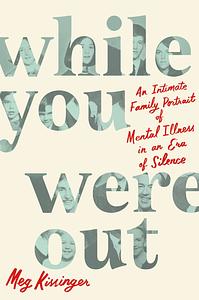Take a photo of a barcode or cover
892 reviews for:
While You Were Out: An Intimate Family Portrait of Mental Illness in an Era of Silence
Meg Kissinger
892 reviews for:
While You Were Out: An Intimate Family Portrait of Mental Illness in an Era of Silence
Meg Kissinger
dark
emotional
informative
mysterious
reflective
sad
tense
fast-paced
Gripping. Triggering. Beautiful.
Wow. This raw gaze into Kissinger's family's stories was powerful. This is such a realistic picture of mental health, its contagion effects, its rippling impacts, and its lifelong roller coaster. I can't fully explain how hard and easy this was to read. I blitzed it and I'd force myself to put it down when I felt I was holding my breath or my stomach was tightening. Some aspects of the book were incredibly intimate and other's were journalistic and kept at arm's length and that balance felt perfect. There's important systemic information on how mental health is navigated in America and there's compelling individual stories that produce empathy and compassion for the individuals caught in the crossfire of a bad system and a tough hand in life. The book, though hard to read and not for everyone, is excellent.
Lines I'm still holding:
Ch 12
'"there's no sense in what-if's," Homer said. "You can't babysit another adult 24/7 for the rest of your life"'
Ch 16
'when should a person's right to autonomy yield to their safety or the safety of others?'
'the more I got to know them, the greater I cared about each of them. To be a great journalist, you have to be willing to be wounded by the stories you tell...you need to find a way to let those broken hearts mend. Don't let yourself get sucked in and chewed up, it's quite a high-wire act.'
Wow. This raw gaze into Kissinger's family's stories was powerful. This is such a realistic picture of mental health, its contagion effects, its rippling impacts, and its lifelong roller coaster. I can't fully explain how hard and easy this was to read. I blitzed it and I'd force myself to put it down when I felt I was holding my breath or my stomach was tightening. Some aspects of the book were incredibly intimate and other's were journalistic and kept at arm's length and that balance felt perfect. There's important systemic information on how mental health is navigated in America and there's compelling individual stories that produce empathy and compassion for the individuals caught in the crossfire of a bad system and a tough hand in life. The book, though hard to read and not for everyone, is excellent.
Lines I'm still holding:
Ch 12
'"there's no sense in what-if's," Homer said. "You can't babysit another adult 24/7 for the rest of your life"'
Ch 16
'when should a person's right to autonomy yield to their safety or the safety of others?'
'the more I got to know them, the greater I cared about each of them. To be a great journalist, you have to be willing to be wounded by the stories you tell...you need to find a way to let those broken hearts mend. Don't let yourself get sucked in and chewed up, it's quite a high-wire act.'
challenging
dark
emotional
hopeful
informative
sad
medium-paced
dark
informative
inspiring
medium-paced
emotional
informative
reflective
sad
tense
fast-paced
emotional
funny
hopeful
informative
inspiring
reflective
sad
medium-paced
Families can be messy and fraught with tragedy but love can still prevail.
challenging
emotional
reflective
slow-paced
challenging
hopeful
informative
inspiring
reflective
sad
tense
medium-paced
5**
This book has to be one of the most difficult memoirs I’ve read, yet so crucial in explaining not only the rampant mental illness the journalist Meg Kissinger experienced with her family members, but how she was able to use her traumatic childhood to write effective, investigative articles that expose the societal gaps in treating those who suffer such debilitating illnesses.
At first, it was a bit of a slow burn with each chapter hinting that the worst was yet to come. And then, slowly throughout in page after page, Kissinger builds the increasing crescendo of horror that makes you crash and burn as you essentially experience the vicarious trauma of alcoholism, severe depression, anxiety, schizophrenia, paranoia, and bipolar disorder of her family members. I am not exaggerating when I say that you will be exhausted and have to put this down quite a few times to process her overwhelming feelings - and yours. Kissinger’s resiliency is nothing short of a miracle to have survived, formed a meaningful and successful journalism career that shines the light on the challenges of treating mental illness, and chose - against all odds - to be happy and forgive.
For mental health, this book is important for knowing what families experience and to see from different perspectives. Kissinger meticulously and admirably researched her own family with court docs, police reports, and other family members to validate and challenge her own personal memories of events. She inserted her own healing journey, and her last two sections bumped up my rating from a 4 to 5*** because of her relentless courage to seek healing and truth for herself despite her risk of shame and embarrassment: “I had a choice…I could feel sorry for myself and wallow in pity or choose to be happy and do what I could to make that happen.” Balancing her objective journalistic integrity with her personal subjective experience was somehow, impossibly, achieved. For society, this book is important because you are forced to contend with the lack of a comprehensive care plan which is haphazardly piecemeal at best.
STRONG trigger warning: suicide is heavily presented, and while she definitely does not glamorize it, Kissinger will describe scenes in detail so that people understand the reality of the person rather than the statistics. These scenes are difficult to say the least, and will make you highly uncomfortable, but they are nonetheless essential to the genuineness of the narrative.
This book has to be one of the most difficult memoirs I’ve read, yet so crucial in explaining not only the rampant mental illness the journalist Meg Kissinger experienced with her family members, but how she was able to use her traumatic childhood to write effective, investigative articles that expose the societal gaps in treating those who suffer such debilitating illnesses.
At first, it was a bit of a slow burn with each chapter hinting that the worst was yet to come. And then, slowly throughout in page after page, Kissinger builds the increasing crescendo of horror that makes you crash and burn as you essentially experience the vicarious trauma of alcoholism, severe depression, anxiety, schizophrenia, paranoia, and bipolar disorder of her family members. I am not exaggerating when I say that you will be exhausted and have to put this down quite a few times to process her overwhelming feelings - and yours. Kissinger’s resiliency is nothing short of a miracle to have survived, formed a meaningful and successful journalism career that shines the light on the challenges of treating mental illness, and chose - against all odds - to be happy and forgive.
For mental health, this book is important for knowing what families experience and to see from different perspectives. Kissinger meticulously and admirably researched her own family with court docs, police reports, and other family members to validate and challenge her own personal memories of events. She inserted her own healing journey, and her last two sections bumped up my rating from a 4 to 5*** because of her relentless courage to seek healing and truth for herself despite her risk of shame and embarrassment: “I had a choice…I could feel sorry for myself and wallow in pity or choose to be happy and do what I could to make that happen.” Balancing her objective journalistic integrity with her personal subjective experience was somehow, impossibly, achieved. For society, this book is important because you are forced to contend with the lack of a comprehensive care plan which is haphazardly piecemeal at best.
STRONG trigger warning: suicide is heavily presented, and while she definitely does not glamorize it, Kissinger will describe scenes in detail so that people understand the reality of the person rather than the statistics. These scenes are difficult to say the least, and will make you highly uncomfortable, but they are nonetheless essential to the genuineness of the narrative.
emotional
hopeful
reflective
sad




